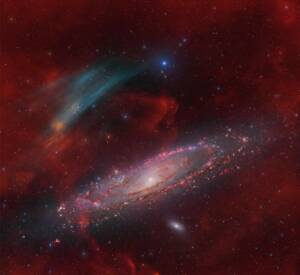
Discovery of the M31 [OIII] emission arc
Recently, a major discovery by an international team of amateur astronomers and scientists has become a huge online hit, and this new discovery is just located in one of the
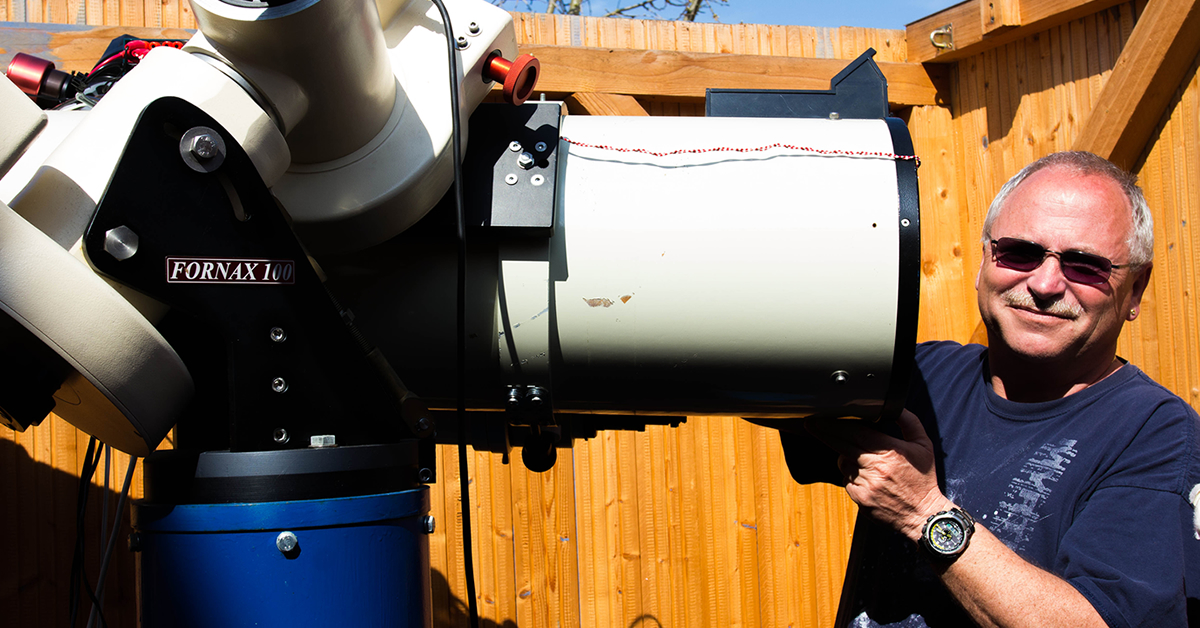
Reinhold Wittich is the winner of ZWO 2020 ASIWEEK #07 and has brought us many extraordinary astronomy photos. To make our ZWOers know this excellent astrophotographer better, we make this interview. Let’s all take a look now.
Hi, I am Reinhold Wittich. I have been a teacher for mathematics and physics since 1977. Now I am retired since 2013. With my wife I live near Regensburg, Germany, next to the river Danube. This is great for imaging birds in flight but imaging the night sky can be difficult sometimes. I started photography when I was 10 years old, but when I started astrophotography I was 50 years old. My father gave me my first telescope in 2003. He was 78 and the telescope was too heavy for him to carry. Expecting that the time of heavy telescopes would come for me too I decided to build my own little observatory in our garden.

Credit: Ernst Waller
When I got my first telescope I knew nothing about astronomy. I looked through the telescope and everything was black and white. There was no color. But I wanted color. A friend of mine told me that I had to take photos if I wanted to see color. So I started to take photos through my telescope.
I always liked photography and I like the words of John F. Kennedy:
„… and do the other things, not because they are easy, but because they are hard …“
Imaging the wonders of DeepSky is the hardest you can do in photography. So I take images of DeepSky, not because it is easy but because it is hard. Astrophotography is a part of my hobby: photography. Photography means that I can show the beauty of the world and I can show things you cannot see with your naked eye.
M31
Sh2-126
IC 5070
I started in 2003 and my first feeling was not like a teacher but like a pupil. I made every mistake you can imagine, so I had very much things to learn. I always was fascinated by the images of Rob Gendler, Jay GaBany, Tony Hallas and other very good astrophotographers. They were very cooperative and I learned many things from them. But I understood that it would take years to reach their level. So I spend years for taking images and processing them. Slowly my images became better and better and after 10 years I got my first APOD.
M42
LBN777
Since 2018 my telescope is a Celestron RASA 11” which is very fast with f/2.2. It is sitting on a Fornax 100 mount which is very stable and can carry much more than my small RASA. My camera is the color camera ASI094MC-Pro. So I can image one object per night. Compared to a mono camera I spare a lot of time which is important under my German sky. Additionally I ordered the new ASI6200MC-Pro mono camera from my dealer to increase the resolution of my images in luminance, H-alpha, OIII etc. I did not get it yet, but I hope I will get it soon. Since 2003 I had all my equipment in my roll-on roll-off observatory. But in 2019 I got the chance to buy a used 3.5m dome. Now my telescope and my mount live in their new house. There are still some things to do with the house but the telescope works since a few weeks.
In the observatory the most difficult part is focusing. It is not frustrating but you have to be very carefully. For best results electric focusing is necessary. I always check the images immediately after they are downloaded to the computer and sometimes I see that I have to focus once again. Sitting in front of the computer image processing is difficult because every picture is different from all others. First steps in PixInsight are always the same and easy. But if it comes to Photoshop there is no best way to the best result. It is always try and error, mainly not technique but art. The most difficult part in astrophotography is the one you cannot control: the sky. Often the sky is not the best for astrophotography, maybe you have too much water in the air or too much moon. But you planned to take images for this night and so you try it. Next day you sit in front of your computer and see that the last night was in vain. You have to trash all images of this night. This is frustrating.
IC2118
Sh2-132
IC 5068
My favorite target is M45, the Pleiades. As you see, I have learned something during the years.
M45_2008
M45_2013
No, I like to do in in our garden. So I can spend time with my wife in the warm house while my camera takes pictures in the cold observatory. And if something goes wrong I have all necessary tools in the house.
This was indeed a daytime astrophoto. It was the total eclipse of the sun in Svalbard, only about 1000 km south of the North Pole. I had no hotel in Svalbard. I had no luggage. I had only my photo bag and a sleeping pad to spend a few hours on the floor of the Longyearbyen airport. I flew from Munich to Longyearbyen, took my images and returned to Munich. I saw Northern Lights from the airplane and the eclipse from Svalbard at the same day. This is really unforgettable. I did not take images of the aurora from the plane, I only enjoyed it. But a few months ago I have been in Alaska to take images of the Aurora and I show you one of them here.
Both images were imaged with the ASI094MC-Pro @ my Celestron RASA 11. 60x 3 minutes for the Pleiades, 68x 3 minutes for the Horsehead. Unity gain, no special settings, temperature at -10°C. Processing with PixInsight and Photoshop CS6.
M45
Horsehead Nebula
For many years I was thinking about a one shot color camera because of the short time of exposure compared with a mono camera. For many years I was not sure about the image quality of a color camera. But the ASI satisfied me.
I have an ASI120 mono camera which I bought for planets and moon. Since my last guiding camera passed away I use the ASI120 as a guiding camera and it works perfect. The camera you buy must fit your telescope. If you want to image DeepSky you need one camera, but if you want to image planets you need a different camera. There is not one camera for all purposes. Look what the best astrophotographers use. Ask them for help and they will help you. If you have the money do not look at the price. Buying cheap means buying twice. You always get what you pay for.
For many years I had mono CCDs like KAF8300 etc. I was very happy with them and took a lot of good pictures with them. But switching to ZWO was like discovering a new world. Big chip, color, low noise, high QE, high full well, everything was a big advantage compared to the old cameras. I think ZWO uses more modern CMOS chips than other manufacturers. They are not cheap, but they are worth the money.
Maybe one thing could be improved. I had a malfunction with my ASI094MC-Pro. I sent it back to my dealer and he sent the camera to china. The problem was fixed and the camera now works perfect again. But it took 2 month. A service point in Europe or better in Germany would help.

Recently, a major discovery by an international team of amateur astronomers and scientists has become a huge online hit, and this new discovery is just located in one of the
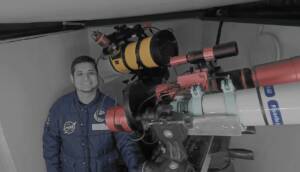
I was born in Guadalajara, I’m 38 years old, a musician, communications and electronics engineer, and president of the Guadalajara Astronomical Society A.C. since 2020. First Contact with Astronomy Since
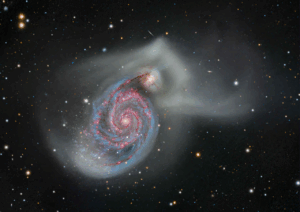
This stunning collaborative project comes from astrophotographers Alex Linde and Thomas Hansson, who joined forces across borders to photograph the Whirlpool Galaxy from Sweden, Poland, and Texas, USA. Thomas traveled across
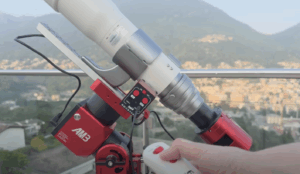
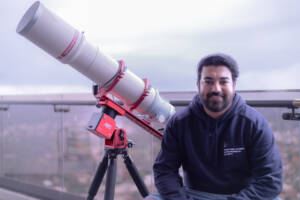
“Two thoughts immediately crossed my mind—the vastness of the cosmos, and that I could also create images like the ones that inspired me.” ” If you spend more time debugging than
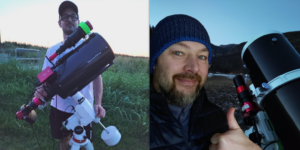
Starting the Journey For Giovanni Pasquetto, the passion for the cosmos began in 2007 when he bought his first telescope—a small Newtonian—for his son. That initial curiosity sparked a love